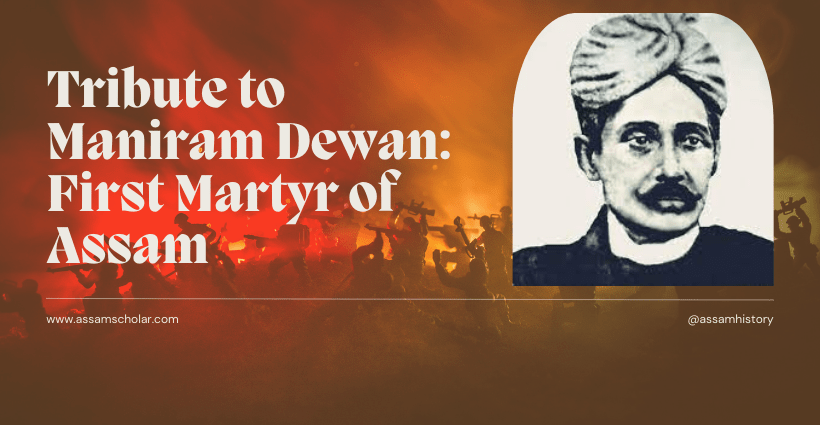Maniram Dewan is a well-known name in the history of Assam. He was the first martyr of Assam in the Sepoy Mutiny of Assam, a devotee of the British early in his life, later became a fierce rebel against the British and was eventually hanged. He was a publisher, writer, entrepreneur and revolutionary at the same time. Maniram Dewan, who was educated from an Ahom official to a British officer, was the first Assamese to start tea cultivation and became the first industrialist in Assam.
Maniram Dewan was born on 27 April 1806 in Charing, historical Shivsagar district. Dewan’s father was Ram Dutta Dolakasaria Barua and his mother was Kaushalya. His father was the Dolakasaria Barua of the Ahom Emperor Kamaleshwar Singh. Maniram Dewan’s ancestors were very noble. Dewan’s full name was Maniram Dutta Barbhandar Barua Dewan.
Education :-
Shortly after the birth of Dewan, the Burmese invaded Assam. Maniram Dewan’s father Ram Dutta fled with his family to Chilmari in Bengal with His Majesty Purandar Singh to save his life in the wake of the Burmese invasion of Assam. Maniram Dewan began his educational career in Chilmari, Bengal. After receiving his primary education there, his family moved to Goalpara where he received his further education. He became proficient in almost all subjects including geography, history, economics, politics, etc. and came under the scrutiny of the British.
Dewan’s career under British administration :-
Maniram Dewan was the son of a very wealthy family. He inherited many movable and immovable properties from his ancestors. In addition to inheriting these properties from his ancestors, Maniram had some qualities of his own. They were his cleverness, political and administrative skills. These qualities enabled him to approach high-ranking British officials very quickly. When David Scott came to Assam to defeat the Burmese during the First Anglo-Burmese War, David Scott was guided by Maniram Dewan as he had considerable knowledge of the geography of Assam. He provided a lot of information about Assam to the British officers and became a trusted person of the British.
In 1828, Captain Newville, the political agent of Upper Assam, appointed Maniram Dewan as the Chirstadar-Tahsildar of Upper Assam. He excelled in the post of Chirstadar-Tahsildar and enriched the British treasury. He introduced new methods of revenue collection and it was due to these policies that the revenue of Upper Assam was increased from Rs. 38,836 in 1827-28 to about Rs. 1 lakh in 1829-3 Maniram Dewan won the praise of the British government for this. He compared the British to Indra, the king of the gods, for expelling the Burmese and establishing peace in Assam and wished for thousands of years of British rule in Assam. Maniram Dewan hated the rebellions of Assamese youths like Piyoli Fukan and Gamdhar Konwar and told the British to punish the rebels severely.
In the royal court of His Majesty Purandara Singh :-
On 9 March 1833, Swargadeo Purandar Singh was established as a British vassal king of Assam. During the administration of Swargadeo Puranda Singh, Maniram Dewan held the rank of Barbhandar Barua of the king and also served as the chief advisor to the king. Swargadeo Purandar Singh also entrusted Maniram Dewan with the responsibility of inspecting some revenue groups and mouzas. Maniram Dewan was the medium of communication between Swargadeo Purandar Singh and the British rule. Maniram Dewan was so famous at the time that he was also called the “Kalita Raja”.
The British deposed Purandara Singh from the throne of Assam on 26 September 1838 for failing to pay the tax of Rs. 50,000 per annum for three consecutive years. (Many believe that Purandara Singh sent Rs. 150,000 to Maniram Dewan to give to the British. Maniram Dewan went to Bengal with Kashinath Tamuli Phukan and Lathou Kharghariah Phukan to pay Rs. 1.5 lakh tax but he did not hand over the amount to the British.)
Maniram Dewan became more ambitious for power. The British administration deposed Purandara Singh and took over the power of Assam. After the British occupation of Assam, he went to Calcutta in 1838 and met Deputy Governor Thomas Campbell Robertson and asked him to appoint a prince of the Ahom dynasty as king of Assam. And if he was given the throne, he agreed to pay three years’ tax of Rs. 150,000 to the British on the same day. However, the British refused Maniram’s proposal and promised to give him an honorary post. However, Lieutenant Brody, who had just joined as the Assistant Principal of Shivsagar, gave only three mouzas to Maniram Dewan and took away the rest.
Maniram Dewan’s career under the Assam Tea Company:-
Maniram Dewan was appointed Dewan of the Assam Tea Company by the British on 1 June His salary at that time was six hundred rupees. The Assam Tea Company under the leadership of Maniram Dewan made steady progress. This was due to Maniram Dewan’s deep knowledge and experience of the local situation. He doubled the plantations of the Assam Tea Company. In 1844, he was appointed as the second Dewan of the Assam Tea Company and his salary was reduced to Rs. 200. Maniram Dewan was dissatisfied with these reasons and resigned from the post of Dewan of the Assam Tea Company in
As the first Assamese tea farmer:-
Maniram Dewan and the tea tree had a very close relationship. The main person involved in the discovery of tea trees in Assam is Maniram Dewan. He was the person who indirectly helped Robert Bruce to discover the tea tree. He learned about the tea tree from the Singphou villager and informed Robert Bruce. A British writer named Samuel Weldon in his book “Tea in Assam” attributes Maniram Dewan to the real inventor of tea in Assam. A book entitled “Tea Industry in India“ states about Maniram Dewan -“The first attempt to compete with the Britishers was made by Maniram Dewan, who is regarded as the first Indian discoverer of indigenous tea plant in Assam.”
Maniram Dewan was the first Assamese and Indian tea farmer. He had considerable experience as Dewan of the Assam Tea Company. After resigning from the post of Dewan of the Assam Tea Company he opened two tea plantations in Jorhat on his own. Maniram Dewan had two plantations – Chinamara and Chenglung.
Aversion to the British:-
Maniram Dewan opened tea plantations and achieved enviable success. The value and popularity of his tea leaves increased due to its high quality. The British were alarmed by the popularity of Maniram Dewan’s tea and tried to destroy his tea cultivation business. The British government refused to give Maniram Dewan arable land for tea plantations for less money than it had given to European tea farmers. He had to give up a lot of land because of the high rent. In 1851, the new Assistant Principal of Shivsagar, Charles Holroyd, took away the three mouzas belonging to Maniram Dewan. This made Maniram Dewan an ordinary man and he had problems to support his family of eighteen (18).
This gave birth to Maniram Dewan’s aversion to the British. Born with a golden spoon in his mouth, Maniram became an ordinary man under the power of the British. In fact, the British used Maniram Dewan to their advantage in Assam. After the British became well acquainted with Assam, Maniram Dewan became unnecessary for them.
Maniram Dewan belatedly understood the imperialist and power-hungry character of the British. But by then it might have been too late. First, Maniram Dewan tried to re-establish the Ahom kingdom in Assam through petitions. When Andrew John Moffat Mills arrived in Assam at that time, Maniram Dewan applied to the Charing king Kandarpeswar Singh as the tributary king to give him the rule of Assam. However, Mills rejected Maniram Dewan’s application and warned the British Government of Assam that “Maniram Dewan is a clever but unreliable and conspiratorial man.
Finally, Maniram went to Calcutta to try it for the last time. There he requested the Lieutenant Governor, Sir John Campbell, to hand over the rule of Assam to Kandarpeswar Singh as the tributary king. On 6 May 1857, Maniram Dewan sent a petition to the Governor General. But even this last attempt of Maniram was thwarted and Maniram this time ended the chapter of petitions and resorted to rebellion.
The 1857 rebellion in Assam led by Maniram Dewan:-
After receiving no response from the British authorities, Maniram Dewan decided to rebel against the British. While Maniram was busy treating his arthritis in Calcutta, the sepoy mutiny broke out all over India. Maniram Dewan was delighted to receive the message of the capture of Delhi by the Indian sepoys and was inspired to rebel against the British in Assam. Maniram himself organized the rebellion while in Calcutta. He secretly contacted influential people of Assam including Charing Raja Kandarpeswar Singh and Piyoli Barua and began preparations for the rebellion.
He was busy with medical treatment at the time and sent a Bengali gentleman from Calcutta, Madhu Mallik, to Assam as an advisor to the rebellion. The people of Assam, led by Maniram Dewan, organized for rebellion. On the advice of Maniram Dewan, Piyoli Barua took the lead in obtaining the assistance of the Indian sepoys in Assam and in gathering weapons and supplies. In addition, Bahadur Gaonbura, Farmud Ali, Dutiram Barua, Mayaram Nazir, Mahidhar Muktiar and others joined the anti-British uprising in Assam.
The residence of Charing King Kandarpeswar Singh was the center of the main discussions of the rebellion. The rebels organized discussions under the guise of bhaonas and dances to deceive the British. On the advice of Maniram Dewan, everyone fulfilled their responsibilities and prepared for the rebellion. The sepoys of Assam also supported the anti-British rebellion. Maniram Dewan was scheduled to arrive in Assam with weapons during Durga Puja and the rebels were planning to rebel on Durga Puja Dashami.
The British government got a glimpse of the anti-British uprising in Assam in mid-August The British loyal daroga Harnath Parbatia Barua recovered several letters from Dewan containing information related to the rebellion. He recovered the letter and handed it over to Principal Assistant Holroyd, and this led to the end of the anti-British uprising in Assam.
The British authorities immediately began to put down the rebellion. On 7 September 1857, the British arrested King Kandarpeswar Singh of Charing and sent him to Alipur Jail in Calcutta. At the same time, the British authorities in Calcutta arrested Maniram Dewan and threw him into Alipur jail. They also arrested Piyoli Barua, Madhu Mallik, Bahadur Gaonbura, Farmud Ali, Dutiram Barua and many others. And that was the end of the 1857 anti-British awakening in Assam.
Execution of Maniram Dewan:-
At the end of 1857, He was brought to Jorhat by ship for trial. On 23 February 1858, Maniram Dewan and all the other rebels were tried. In this trial, Maniram Dewan and Piyoli Barua were sentenced to death for treason. They also confiscated all the property of the rebels like Bahadur Gaonbura, Farmud Ali, Dutiram Barua, Madhu Mallik and deported them to Kalapani, ie Andaman. Charing Raja Kandarpeswar Singh was given a pension in Guwahati and kept under surveillance.
On 26 February 1858, Dewan and Piyli Barua were publicly hanged in the middle of Jorhat city. Maniram Dewan was martyred for setting the fire of rebellion for the independence of the country. He was the first martyr of Assam in the Sepoy Mutiny. Dewan, who was a strong supporter of the British early in his life, later realized the true character of the British and took up arms against them and was martyred for the sake of the motherland. Maniram Dewan not only showed the Assamese the way to become economically self-reliant by cultivating tea.
Click Here for the Previous Year’s APSC Question Paper
Moreover, your support has been invaluable to us. We are grateful for your continued support…
Follow us on

